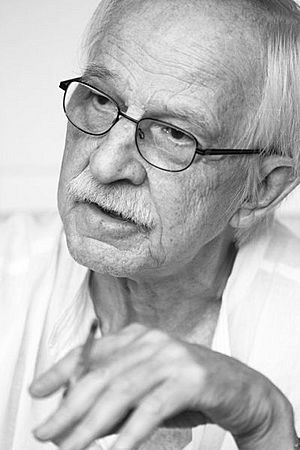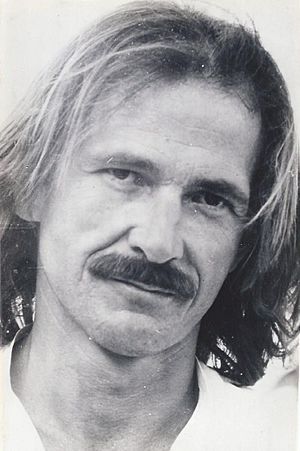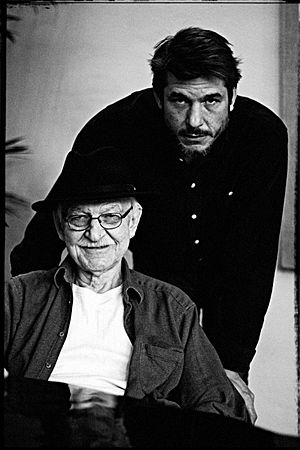Antonio Escohotado facts for kids
Quick facts for kids
Antonio Escohotado
|
|
|---|---|

Escohotado in 2014
|
|
| Born |
Antonio Escohotado Espinosa
5 July 1941 |
| Died | 21 November 2021 (aged 80) Ibiza, Spain
|
| Era | 20th-century philosophy Contemporary philosophy |
| Region | Western philosophy |
| School | Continental philosophy Post-Hegelianism Liberalism Post-Marxism (early) |
|
Main interests
|
Liberalism, metaphysics, culture, ethics, freedom, history of communism, sociology, politics, dialectic, Marxism, fractal, history of commerce, political philosophy, history of slavery, law |
|
Influences
|
|
Antonio Escohotado Espinosa (5 July 1941 – 21 November 2021) commonly called Antonio Escohotado was a Spanish philosopher, jurist, essayist and university professor. His life's work primarily focused on law, philosophy and sociology, yet extended to many other disciplines.
Contents
Early years
From Brazil to Spain
The Escohotado family, a long-time resident of the northwest of the Madrid mountain range, has its first notorious member with Escohotado's great-grandfather, Vicente, who supported the Glorious Revolution of 1868 as mayor of Galapagar. The son of the former (and grandfather of Escohotado), also named Vicente, was one of the first scholarship holders of the town to study law, and when he had already published an extensive history of theater in verse, La teatrada (1925), along with several books of planhs and songs, he went from being a solicitor to mayor of El Escorial. The sixth of his sons, Román (1908-1970), father of Antonio Escohotado, began by voting for the socialist Julián Besteiro and ended up signing the Manifesto of the Spanish Falanx. He was head of Dionisio Ridruejo's secretariat during his time as director general of Propaganda, directed Radio Nacional from 1941, won the main journalistic awards (including the Mariano de Cavia prize) and was press attaché in Brazil from 1946 to 1956.
When the family returned to Spain, Escohotado experienced the abrupt contrast between the tropical paradise of his early childhood and the gray and severe society of National Catholicism, which led him to forge a spirit of rebellion generated by the newfound authoritarianism.
Escohotado enlisted with the Vietcong in their war against the United States. A chronic hepatitis allowed him to shorten his period of military service and forced him to reflect on his future. He then decided to prepare for competitive examinations compatible with leftist commitment —which excluded those of Diplomat, a career to which he seemed to be naturally inclined due to his father's example and his training in languages and general culture— and finally joined the Official Credit Institute (Spanish: ICO) in 1964 to manage the service of Fusión y Concentración de Empresas during five years of economic prosperity. A position that was compatible with that of assistant in the faculties of Law and Politics at the Complutense University; as well as organizing a seminar on Kant and Hegel at the Autonomous University of Madrid and a course on Psychoanalysis at the now defunct School of Anthropology.
He then began to publish, in addition to giving practical classes or seminars in the faculties of Politics and Philosophy, where he developed a relationship with colleagues such as Carlos Moya, Eugenio Trías Sagnier and Felipe Martínez Marzoa, and discovered somewhat younger authors such as Savater, Azúa and Echeverría.
Initial publications
He began to publish under the guidance of José Ortega Spottorno, who had just relaunched the publishing house and reissued the Revista de Occidente —both founded by his father, Ortega y Gasset.
His professor of Philosophy of Law and later thesis director —Luis Legaz Lacambra, who translated The Protestant Ethic and the Spirit of Capitalism and was a disciple of Kelsen— was astonished when Escohotado presented him with the academic work four months before finishing his degree. The professor took a few days to examine the text and only suggested to the doctoral candidate that he included a chapter on the moral law and positive law in Kant.
With the same blueprint he wrote his doctoral thesis, The Moral Philosophy of the Young Hegel, which, presented in 1970, annoyed part of a tribunal that received it as an "apology on Marx's mentor, a Protestant on top of that", provoking on several occasions the absence of the quorum required to grade the work.
When it was published —as The Unhappy Conscience. Essay on the philosophy of religion of Hegel (Revista de Occidente, 1972)—, the small academic uproar was followed by the inclusion of the work in the Index of heretical texts, at the same time that it won the New Criticism prize, a short-lived award. Forty years later, recapitulating on the research, Escohotado maintains "a distinction between spirit and positive religion. By embodying the rupture between life and its fossil, Christianity would be the reality captured in the form of fantasy and vice versa, the truth estranged from itself. It was my first contact with the divergence between intention and result".
Academic obstacles made the later Marcuse, utopia y razón (Alianza Editorial, 1968), a book focused on examining the compatibility of Marx with Hegel and Freud proposed by one of the founders of the Frankfurt School, whose synthesis was very attractive for that precise moment, appear earlier. Escohotado analyzed the premises that articulated the Marcusian theses. First, he focused on the figure of Freud who "was subjected to a straitjacket typical of Marxism at that time, which was an identity of structure between alienation and repression, clearly unsustainable". The second author was Hegel who "was forgotten in the essentials of his method —dialectics— which does not consist in 'judging', but rather, in 'exposing'". The book made certain sectors of Spanish Marxism of the time uncomfortable by qualifying the text as "revisionist" and even provoked a brief polemic with one of the relevant intellectuals of the time, Gonzalo Fernández de la Mora. Nevertheless, the book obtained some positive reviews.
It would be one of the first, if not the first monograph dedicated to this school in Spain, and also the writer's first sales success. The edition sold out in barely a month, perhaps thanks to the fact that half of Europe would wake up to graffiti like "Marx, Mao and Marcuse". But the author objected to reprinting it, believing that it was written in haste and "in full self-importance syndrome". After these initial works, Escohotado became increasingly detached from utopian positions.
Ibiza and metaphysics
Thanks to a leave of absence from his civil service that was not to last more than two years, Escohotado set out in 1970 to experience a life without luxury, sustained by the income obtained through translations, and dispensing with conventional habits, moving to Ibiza.
Between 1970 and 1983 Escohotado translated more than forty titles for different publishers, among them the only comprehensive anthology of Thomas Jefferson, Hobbes' Leviathan and Newton's Philosophiæ naturalis principia mathematica. When he received his widowed mother's inheritance in 1976, it occurred to him to transform a large old farmhouse into a meeting place for the "tribe" —basically equipped with instruments for live music— which would become Amnesia, one of the most multitudinous and best known discotheques in the world.
Shortly afterwards he published Historias de familia, cuatro mitos sobre sexo y deber (Anagrama, 1978), his first anthropological essay. The work examines the marital model exemplified by Mary and Joseph, in the light of the contrast offered by the relationship of Gilgamesh with Ishtar, that of Zeus with Hera and that of Hercules with Deyanira.
Escohotado had re-entered the National University of Distance Education (UNED) as a part-time assistant in 1980.
Later years and death
The last five years of the thinker's life was marked by a close professional collaboration with his third son, Antonio Jorge Escohotado Álvarez de Lorenzana (Madrid, 1977) who is a journalist and entrepreneur. At the end of 2017, he decided to found La Emboscadura Editorial with the aim of spreading Antonio Escohotado's thought globally by issuing his collection in E-book format. To forge the editorial project, he managed the social networks by opening profiles on Twitter, Facebook, Instagram, LinkedIn, Pinterest and YouTube. His YouTube channel stores and compiles vast audiovisual content of the philosopher ranging from interviews to conferences given throughout Spain and Latin America. This channel exceeded 125,000 subscribers at the end of 2021.
His son Jorge not only carried out work as a community manager, but served as the editor of the third volume of The Enemies of Commerce (Espasa, 2017) and promoter of works such as My Ibiza Privada (Espasa, 2019) and La forja de la gloria (Espasa , 2021); the last text published by Escohotado where the author briefly covers and collects the history of Real Madrid from a philosophical, moral and cultural point of view.
The name of the publishing house was chosen in honor of the famous essay The Forest Passage (1951) by Ernst Jünger, which according to Escohotado's own words is "the greatest book of the entire 20th century, along with Camus's The Rebel".
There is no doubt that the Ibizan environment has been a fundamental piece in both the biography and the intellectual development of Antonio Escohotado's work. At the end of 2019, the essayist leaves his usual home in the Madrid town of Galapagar to settle in the Pityuses with the intention of spending the last years of his life.
During this period, the journalist of the newspaper El Mundo, Ricardo F. Colmenero, published Los penúltimos días de Escohotado (Los penúltimos días de Escohotado) (La Esfera de los Libros, 2021), a compilation of conversations between the philosopher and the columnist where he openly declares, among other things, that he had returned to Ibiza to await his death.
Although the writer was retired, he did not stop receiving regular visits from curious onlookers, fans and disciples, but also from personalities as diverse as the singer Jorge Drexler, José Antonio Matamoros or the president of Real Madrid, Florentino Pérez. He was also quite active in the media as he continued to give interviews and collaborated in some YouTube streaming program.
Antonio Escohotado Espinosa died in the early hours of November 21, 2021 at the age of 80 as a result of multiorgan failure (renal, pulmonary and cardiac) at the Policlínica de Nuestra Señora del Rosario in Ibiza surrounded by his loved ones. He was intered in the civil cemetery of the secluded village of Santa Inés de Corona.
See also
 In Spanish: Antonio Escohotado para niños
In Spanish: Antonio Escohotado para niños



